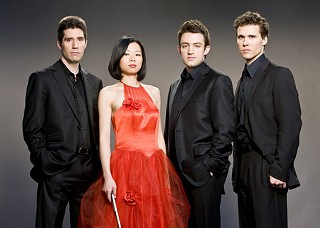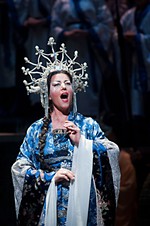Escher String Quartet
Despite flashes of fire, this concert by ACMF's 2010 quartet-in-residence felt cold
Reviewed by Michael Kellerman, Fri., Aug. 6, 2010
Escher String Quartet
First Unitarian Church
July 30
The Dutch artist M.C Escher, from whom this year's Austin Chamber Music Festival quartet-in-residence draws inspiration, was known for his ability to take individual components and
weave them into fantastic and mind-bending works of art. It's a fitting emblem for a string quartet, as the success of any small ensemble relies on that fine balance between the individual performances and the voice created by their sum.
There's no doubt that each member of the Escher Quartet brought gobs of talent with them to Austin. One needed only to hear violinist Adam Barnett-Hart's virtuosic work in the opening movement of Haydn's famous String Quartet No. 30 ("The Joke"), or violist Pierre Lapointe's mournful solo material to open the Bartók String Quartet No. 6 for proof. Judging by the standing ovations following the first and second acts, I may be in the minority here, but taken as a whole, the quartet's concert was a bit of a letdown.
The ensemble's sound was bold and robust from the first notes of the Haydn. Credit is certainly due for their enthusiasm, but this was "The Joke," a playful and frothy piece that, if anything, calls for a bouncy, delicate touch. In the second and third movements, balance issues persisted in the inner voices, which contributed to a generally heavy-handed performance. The players shone brightly, however, at the very end with an entirely convincing take on Haydn's musical prank. Though this effective showmanship drew laughter from the crowd, the performance that preceded it was generally flat.
The Bartók quartet certainly provided the ensemble some meatier material, and again there were moments of inspired work. Written just before Bartók fled Europe as it descended into World War II chaos, the piece is fraught with sadness, paranoia, and fear. I heard an audience member compare the sound to a Hitchcock film score, which fittingly captured the spirit of the piece. Here the Escher Quartet had a chance to delve into denser emotions, but they never seemed to truly connect to the piece. Though the performance was sound technically, it came across as overly clinical and disjointed.
The performance concluded with Beethoven's String Quartet No. 7, often referred to as the "Russian Quartet," as it was written on commission for the Russian ambassador to Vienna at the time. The first of Beethoven's middle period quartets, this piece has all the adventurous spirit for which the master is famous, from the bucolic opening themes of the first movement to the fiery second movement and majestic final movement, inspired by a Russian hymn. The quartet's performance was stronger than in the first half and displayed a greater sense of cohesion. It was a satisfying conclusion.
After all was said and done, it was tough to know just how much the musicians themselves enjoyed their performance. Perhaps this was part of what made the concert seem a bit cold to me. The heart of any successful performance is an engine of inspiration that you can feel as an audience member. Here, this was lacking. Given the rigors of their monthlong devotion to the festival through master classes, workshops, and public performances, perhaps the members of the Escher String Quartet had merely run out of gas.











